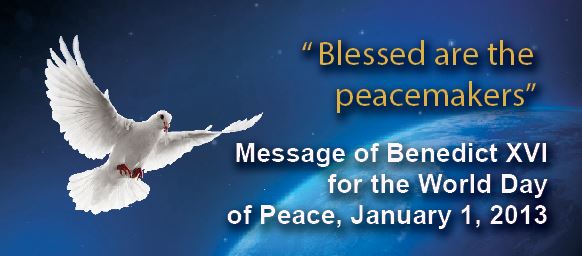“Blessed are the peacemakers”

Since 1968, the Roman Catholic Church celebrates, the Word Day of Peace every January 1st, Feast of Mary, Mother of God. Below are excerpts from Pope Benedict’s 2013 message for the day, entitled “Blessed are the peacemakers, for they will be called children of God” ((Mt 5, 9):
Each new year brings the expectation of a better world. In light of this, I ask God, the Father of humanity, to grant us concord and peace, so that the aspirations of all for a happy and prosperous life may be achieved.
Our times, marked by globalization with its positive and negative aspects, as well as the continuation of violent conflicts and threats of war, demand a new, shared commitment in pursuit of the common good and the development of all men, and of the whole man.
It is alarming to see hotbeds of tension and conflict caused by growing instances of inequality between rich and poor, by the prevalence of a selfish and individualistic mindset which also finds expression in an unregulated financial capitalism. In addition to the varied forms of terrorism and international crime, peace is also endangered by those forms of fundamentalism and fanaticism which distort the true nature of religion, which is called to foster fellowship and reconciliation among people.
The path to the attainment of the common good and to peace is above all that of respect for human life in all its many aspects, beginning with its conception, through its development and up to its natural end. True peacemakers, then, are those who love, defend and promote human life in all its dimensions, personal, communitarian and transcendent. Life in its fullness is the height of peace. Anyone who loves peace cannot tolerate attacks and crimes against life.
Those who insufficiently value human life and, in consequence, support among other things the liberalization of abortion, perhaps do not realize that in this way they are proposing the pursuit of a false peace. The flight from responsibility, which degrades human persons, and even more so the killing of a defenceless and innocent being, will never be able to produce happiness or peace. Indeed how could one claim to bring about peace, the integral development of peoples or even the protection of the environment without defending the life of those who are weakest, beginning with the unborn. Every offence against life, especially at its beginning, inevitably causes irreparable damage to development, peace and the environment. Neither is it just to introduce surreptitiously into legislation false rights or freedoms which, on the basis of a reductive and relativistic view of human beings and the clever use of ambiguous expressions aimed at promoting a supposed right to abortion and euthanasia, pose a threat to the fundamental right to life.
There is also a need to acknowledge and promote the natural structure of marriage as the union of a man and a woman in the face of attempts to make it juridically equivalent to radically different types of union; such attempts actually harm and help to destabilize marriage, obscuring its specific nature and its indispensable role in society.
In order to emerge from the present financial and economic crisis – which has engendered ever greater inequalities – we need people, groups and institutions which will promote life by fostering human creativity, in order to draw from the crisis itself an opportunity for discernment and for a new economic model. The predominant model of recent decades called for seeking maximum profit and consumption, on the basis of an individualistic and selfish mindset, aimed at considering individuals solely in terms of their ability to meet the demands of competitiveness. Yet, from another standpoint, true and lasting success is attained through the gift of ourselves, our intellectual abilities and our entrepreneurial skills, since a “liveable” or truly human economic development requires the principle of gratuitousness as an expression of fraternity and the logic of gift.
Benedict XVI